- Home
- J. Clifton Slater
Neptune's Fury Page 18
Neptune's Fury Read online
Page 18
“You said it not me,” Thomasious explained. “If he’s been arrested, it appears someone other than the navy is laying claim to the trireme.”
“Senator Duilius should be able to find out who that is,” Civi said as he climbed onto his mount.
Civi Affatus jerked the animal’s head around to face the street and dug his heels into the horse’s flanks.
“Senator Gaius Duilius. He’s involved in this?” Thomasious Harricus cried as Civi trotted out of the harbor area. “I am without fail cursed by Muta.”
***
Alerio sat in the dark and smelly room with the low ceiling. It took a long while of standing with his head bent to the side before the knot in his neck forced him to sit on the frame of the bed. While he could now hold his head up, he couldn’t bring himself to lay on the dirty straw bedding.
Outside the room, the door rattled as the beam was lifted off the brackets.
“Step away from the door,” a voice ordered.
Alerio chuckled. The room was not only lacking in height, but the depth was just a little longer than the door was width. The thought of standing stooped over while pressed against the wall and arm’s length from the door tickled him. But he moved as far from the door as the small cell allowed.
“What’s funny,” a guardsman inquired.
Two lanterns behind the man made him an outline in the doorframe. Then delicious aromas drifted to Alerio.
“Just giddy from lack of food,” Alerio lied. “Is that for me?”
“Strew, bread, and one lantern,” the guard replied.
He placed a tray on the floor and after taking the lantern from the man behind him, he set it near the tray.
“Aren’t you afraid of fire in the cell?” Alerio questioned.
“Not at all, Centurion,” the guardsman admitted. “If there’s a fire and you burn, it’ll save us the trouble of transporting you to the Temple of Jupiter Capitolinus in the morning.”
“Why am I going to the Temple?” Alerio demanded.
“For the same reason all prisoners go there,” the guard replied while backing out of the cell. “To stand trial.”
Then he closed the door. Alerio was still sitting on the bed when the beam dropped into the brackets.
Chapter 26 - Momus, The God of Mockery
Trials were public affairs with over one hundred citizens in attendance and they were held in the forum. A pair of Praetors, in white robes to identify their purity of thought, presided over the legal arguments before rendering a final judgement. And a scribe jotted down every aspect on parchments to record the trial for the public archives. In that case, Alerio could tell his side of the story and plead his case to the citizens.
Unless the trial was a tribunal convened in a temple. Then, the laws of Rome as written on the Twelve Tables intermingled with the edicts of the Gods as deciphered by Priests. Bile rose in Alerio’s throat and his appetite fled from the lingering stink of the stockyard man.
Alerio eventually sank to the floor, scooted over to the tray, and ate. But he didn’t remember the taste. His mind traveled over the months in Stifone and Amelia and he worked all night to recall every detail of his negotiations with Nardi Cocceia. The lantern had long ago burned out when the locking beam scraped while being removed and the door opened.
“Let’s go,” a guardsman ordered.
Alerio peered over the man’s shoulder at the dark yard.
“Awful early,” he commented.
“Move,” the man insisted.
Ducking under the doorframe, Alerio came upright outside the cell then stopped. The man, rather than a city guardsman, was a temple guard. Plus, in the torchlight, Alerio saw robed figures standing at the back of a covered cart. The Priests weren’t the problem, nor were the armed temple guards. It was the ominous covered cart and the fact that none of the city guard commanders cared to watch the prisoner transfer.
During his trip to the temple, Alerio would be blind and unobservable to any citizen. For all purposes that mattered, Alerio Sisera’s fate was already sealed.
“Get in the cart,” the temple guard ordered.
Resigning himself to the gods, Alerio climbed in the cart and settled on the bench. The goatskin cover closed, a voice encouraged the mule with the crack of a whip, and the cart began to roll.
***
The cart crossed the city and, other than jerking from side to side, the road felt flat. Then, Alerio sensed the incline as the cart started up Capitoline Hill. Back and forth on the winding road, Centurion Sisera visualized the way. Based on hiking tours of the city, he knew the twisting street topped out above the Tarpeian Rock. A half mile beyond the deadly drop, the Temple of Jupiter occupied the apex of the hill.
It didn’t escape Alerio’s notice that the tribunal was being held in the temple closest to the deadly cliff. A place notorious for not only the execution of people convicted of capital crimes but, the undignified and humiliating legacy of shame suffered by people thrown from the cliff over the Tarpeian Rock. Yet, he might have been reading more into the location than his situation warranted.
Two things belayed his worry. Jupiter was the patron of good faith and Tribune Subausterus was certainly acting in bad faith. The temple seemed a fitting place to reveal the truth. And, those sentenced to be thrown from Capitoline Hill were fed a solid, heavy meal before the execution. Seeing as Alerio hadn’t even been provided a light breakfast, he set his concerns aside. Instead, he concentrated on forming his best arguments.
***
The sounds from the wheels told the tale of transitioning from stone pavers to fired clay tiles. When the cart stopped, the cover parted, and Alerio stepped down onto the tiles of a courtyard.
The main temple of Jupiter towered over lower buildings that created the sides and back of the enclosure. Columns lined covered walkways that connected offices, where the temple’s business was conducted and where the Priests lived.
While the cart drove away, the entourage remain. A guard directed Alerio in the direction of a door. As they moved, most of the Priests and guards walked away. By the time Alerio reached the entrance, his escorts were reduced to a Priest and two temple guards.
“You’ll find light refreshments to break your nightly fast,” the last Priest explained. He pulled off his cloak, revealing a yellow robe and added. “Plus, you’ll find a dark colored tunic. You will face the Praetor as a citizen of the Republic and not as one of her defenders. Leave the Centurion armor and helmet in the room.”
“The officer gear is borrowed,” Alerio informed him. “After this is over, I’ll need them back.”
“Or you won’t care,” the Celebrant of Jupiter advised. “Change clothing and eat. I’ll be back to get you when all the parties are assembled.”
Alerio cast a look at a small platter of bread, cheese, olives, and a pitcher of vino. A peak into the carafe showed him the vino was diluted with an excess of water.
“I’ve had better,” Alerio remarked. “And I’ve had much worse. Thank you.”
The Priest didn’t comment, he simply closed the door. Along with candles, the other light in the room came from high slits in the walls. Not as large as windows, but more substantial than cracks, they were open enough to allow the first rays of the rising sun into the room. As if painted on, the strip of light clung to the ceiling.
Alerio pulled off the helmet, placed it beside the food, then began unstrapping his armor.
***
Another yellow robed Cleric and a different pair of temple guards came to collect Alerio. He checked to see how far down the wall the sunlight had traveled. His only sense of time was the band of light pouring through the slits. The strip of light hit the bricks a hands width below the ceiling. It was still early.
“In the Legion, if we started anything this late in the day,” Alerio suggested to the Priest of Jupiter. “the Senior Centurion would accuse us of sleeping in. I guess living in a temple gives you an altered sense of life.”
“The Tem
ple of Jupiter is available day and night for those seeking guidance,” the Priest stated while waving an open hand at the door. “All is prepared.”
Alerio straightened the grey tunic and marched out of the room. One guard led them down the covered porch while the other guard and the Cleric fell in behind. Where the colonnade continued at the end of a long building, they turned into an alley. At the far end, the four entered a small amphitheater.
A table with ink and parchment on the surface rested off to the side of the orchestra circle. In the center, a highbacked chair sat facing the tiers of granite benches. Placed between the chair and the bottom row were two tables. One on the left and the other on the right.
“Tiny but convenient for your entertainment needs,” Alerio mentioned to the Priest. “A little intimate, but serviceable. Seen any good plays here lately?”
“Never. This is a teaching auditorium,” the Priest corrected. “And a venue for serious issues.”
Up the center aisle and behind the top row of benches, another Priest raised a knife overhead. He stood by a small altar, spouting invocations. His words flowed in a rhythm but in a cadence so rapid, Alerio couldn’t understand the words.
“Opening the day with prayers,” Alerio said. “Always a good idea.”
“The morning prayers were given at sunrise,” the Priest advised.
Then from behind the altar, a second yellow robed Cleric brought a sheep to the one holding the knife.
“Sky Father, Jupiter, patron of good faith, we offer this sacrifice,” all three Priests boomed as if the volume would travel beyond the clouds and reach the God of Thunder. “We ask only for your blessing of these proceedings.”
The blade plunged into the sheep’s neck. Bleating in pain, the animal quivered before the steel cut deep enough to silence it. Blood spewed onto the ground and, when the sheep fell on the altar, all three Priests dropped to their knees. With their arms raised to the sky, they prayed.
“The life given this day, is given to you with no petition,” the Celebrants of Jupiter intoned. “It is only to make you aware of our activities.”
For a temple as wealthy and popular as the Temple of Jupiter, sacrificing a sheep wasn’t a financial burden. For a household of the average citizen or a craftsman’s shop it was a very generous offering. But it seemed stingy for such a big complex.
“I expected a larger turn out for the morning sacrifice,” Alerio remarked.
Alerio’s mother taught him to be respectful. To honor her, he decided to keep his opinion of the value of the offering to himself.
“Two bulls were sacrificed to Jupiter at sunrise,” the Priest explained while dusting off the dirt clinging to his robe.
“Then why the sheep?” Alerio inquired.
“To bless the events unfolding in the amphitheater,” the Cleric replied while placing a hand on Alerio’s arm and propelling him to a seat at the table on the left.
“I assume then my hearing will be quick,” Alerio proposed. “To clear us out before the big event.”
From a screen behind the orchestra area, a man in a plain tunic entered and walked quickly to the chair and desk. Behind him, a man in a pure white robe entered majestically as if the gods were analyzing his every step. He walked to the highbacked chair and sat, resting his hands on the arms of the chair. Then a shiver ran down Alerio’s spine as a Fetial Priest glided onto the floor of the theater.
The ecclesiastic brother moved to the center of the bottom row. Although he was a Celebrant of Jupiter, the Fetial Consors wore a blue robe with red trim. And to highlight his duties, he wore a red cloth belt with a dagger. Not for fighting, but to remind the Senators who consulted with the order that Jupiter’s judgement could advise war or peace.
The Fetial Priests were God’s spokespersons on foreign affairs and international treaties. Considering Alerio was charged with breaking the trust of a treaty, his worry about Priests, especially Fetiales, inserting the Gods’ opinion into the law was well founded.
Just as the brother sat, another man scurried into view. He carried a pouch with the ends of scrolls sticking out of the top. The man selected a place on the bench between Alerio and the Fetial brother.
Next, a pair walked from around the theaters backdrop and Centurion Sisera came off the bench. He was two steps towards them and would have attacked Ludovicus Humi and Lucius Trioboli, if the Priest and the temple guards hadn’t restrained him. With Alerio held in check, the former Corporal and the Centurion of Subausterus’ Century selected seats on the bench as far from Alerio as possible.
“There’s my answer,” Alerio exclaimed to the Priest. “With those pieces of merda here, we should be able to finish quickly. And the temple can get on with the major event.”
“Centurion Sisera,” the Cleric stated. “There are no other activities scheduled for the venue today.”
Alerio dropped onto the bench. It appeared he was the defendant in a secret tribunal with international ramifications. And, they hadn’t provided him with an Orator or a Jurist advocate.
Almost as if the God Momus descended into Jupiter’s temple to mock Alerio, Jurists Master Imprecari strolled from around the backdrop and entered the orchestra area. The thin lawyer with the bushy hair eyed the meager audience and his face showed disappointment. Obviously, he expected a larger audience for his presentations. He shook off the disappointment and faced the highbacked chair.
“Magistrate, in light of the overwhelming evidence against Alerio Sisera,” Imprecari declared to the judge in the white robe. “the Republic moves to forgo the trial and go directly to sentencing.”
“Orator Imprecari. Save your speech for when we get started,” the judge advised. “Is the defendant’s advocate here?”
Alerio watched the stage backdrop for his legal team. None walked in but the Priest in the yellow robe beside him stood.
“If it pleases the court,” the Celebrant announced. “I will serve as the advocate for Alerio Sisera.”
“Excellent. We seem to have all parties represented. I am Praetor Valerius Seubus and I will be deciding this case,” the magistrate proclaimed. He pointed to a man at the table who was writing down every word. “Our scribe is Master Convelli. Let’s get started. Now you can start Orator Imprecari.”
“Judge, in light of the overwhelming evidence against Alerio Sisera. The Republic moves to forgo the trial and go directly to the sentencing.”
“Denied. State your case and call your first witness,” Praetor Seubus instructed.
Imprecari walked to the table on the other side of the small stadium and began laying out stacks of parchment. Alerio recognized the lawyer from a trip to the east coast and knew him to be a political sycophant. They had clashed during a trial and there was no affection between the infantry officer and the lawyer. Character deficiencies aside, Imprecari was a law scholar and a quality advocate. Which wasn’t good for Alerio.
“Tell me, Priest, that you are a student of law,” Alerio begged. Then he got specific. “Are you blessed of the God Mercury with a quick wit and a tongue that ties adversaries in knots of logic?”
“I am not a man who has spent time studying the Twelve Tablets. Nor am I a whip sharp debater,” the Celebrant admitted. “I am a man of passion who believes in Jupiter’s promise of good faith in all agreements.”
The Fetial glanced over and nodded his approval at the words. Alerio allowed his head to hang and decided he was in deep trouble.
“Do you have a name?” Alerio inquired.
“You may call me Pastor Pamphilus,” the Cleric replied. “Trust in the sky father, young man.”
Alerio felt like pulling the Golden Valley dagger and stabbing everyone in the amphitheater before cutting his own throat. Instead, he folded his arms and waited for Orator Imprecari to state the charges. Then, at least, Alerio would know how bad this trial was going to get.
***
“Some months ago, Alerio Sisera was sent to Amelia in the Umbria region,” Advocate for the Republic
Imprecari said in a voice too loud for the tiny theater. “His job was that of military adviser to Master Ludovicus Humi.”
Alerio gripped Pamphilus’ robe and jerked on the yellow fabric.
“That’s not right,” he insisted.
“Be silent, my son,” the Priest instructed. “You do not want to incur the wrath of the judge.”
Simmering, Alerio released the fabric while muttering, “Nenia Dea, grant me patience.” Then Alerio sat back to listen.
Pastor Pamphilus shifted his eyes and watched to see if Sisera blasphemed a Goddess or prayed in a serious manner. The stoic posture told the Priest Alerio was serious when he mentioned the goddess of death.
“The village of Amelia is an idealistic farming community with a headman named Nardi Cocceia,” Imprecari described. “But Master Cocceia is simply the patriarch of the largest family and so assumes the title of mayor. Now that we have the location and the circumstances, I call as the Republic’s first witness, Master Ludovicus Humi.”
The former Corporal stood and dipped his head to show his humility to the court.
“Tell us why you were in Amelia?” Imprecari questioned.
“I was sent to make an assessment of the viability of the Umbria region as a construction base for warships,” Humi stated. “I found it unacceptable.”
“And why is that?” Imprecari probed.
“The Umbria craftsmen had neither the skills nor the will to build ships,” Humi said. “Plus, the location is too far up the Tiber river. After weeks of talks, I was about to return to the Capital to make my report…”
Alerio leaned over to Pamphilus and whispered, “He wasn’t in charge.”
Orator Imprecari heard the comment.
“Were you in charge of the fact-finding mission?” the Orator asked.
“No, sir. There was a Tribune but he left after the assessment,” Humi answered.
“Let the records show that the staff officer is not part of this case,” Imprecari informed the judge. “The Tribune left before the events occurred that we will discuss. Out of respect for the nobleman, we ask that his name not be included in the records.”

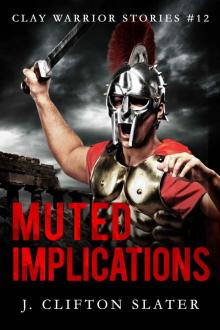 Muted Implications (Clay Warrior Stories Book 12)
Muted Implications (Clay Warrior Stories Book 12) Fatal Obligation
Fatal Obligation Clay Warrior Stories Boxset 2
Clay Warrior Stories Boxset 2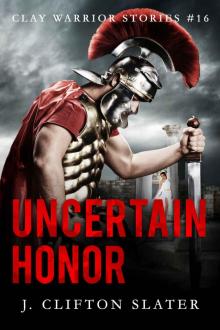 Uncertain Honor
Uncertain Honor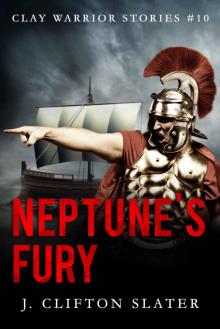 Neptune's Fury
Neptune's Fury Fortune Reigns
Fortune Reigns Op File Treason
Op File Treason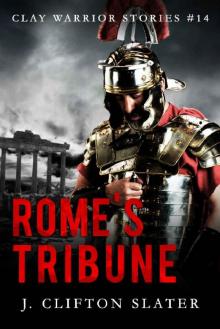 Rome's Tribune (Clay Warrior Stories Book 14)
Rome's Tribune (Clay Warrior Stories Book 14) Clay Warrior Stories Boxset 1
Clay Warrior Stories Boxset 1 Serpent Circles
Serpent Circles Reluctant Siege
Reluctant Siege Infinite Courage
Infinite Courage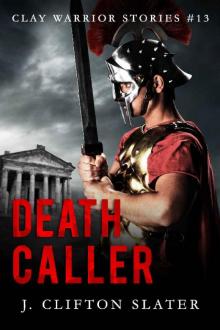 Death Caller (Clay Warrior Stories Book 13)
Death Caller (Clay Warrior Stories Book 13) Op File Sanction
Op File Sanction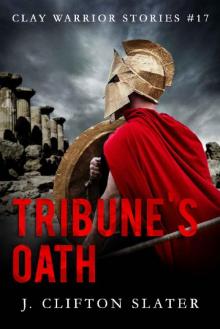 Tribune's Oath (Clay Warrior Stories Book 17)
Tribune's Oath (Clay Warrior Stories Book 17) Galactic Council Realm 1: On Station
Galactic Council Realm 1: On Station Brutal Diplomacy
Brutal Diplomacy Op File Revenge
Op File Revenge On Point
On Point Bloody Water (Clay Warrior Stories Book 3)
Bloody Water (Clay Warrior Stories Book 3)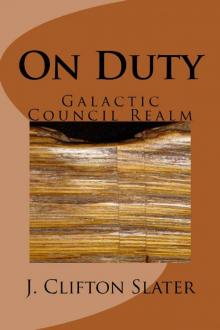 Galactic Council Realm 2: On Duty
Galactic Council Realm 2: On Duty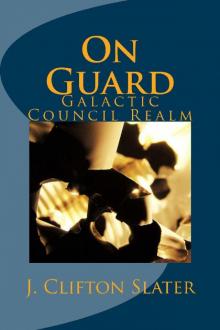 Galactic Council Realm 3: On Guard
Galactic Council Realm 3: On Guard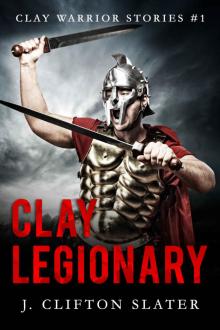 Clay Legionary (Clay Warrior Stories Book 1)
Clay Legionary (Clay Warrior Stories Book 1) On Point (Galactic Council Realm Book 4)
On Point (Galactic Council Realm Book 4) Op File Revenge (Call Sign Warlock Book 1)
Op File Revenge (Call Sign Warlock Book 1)